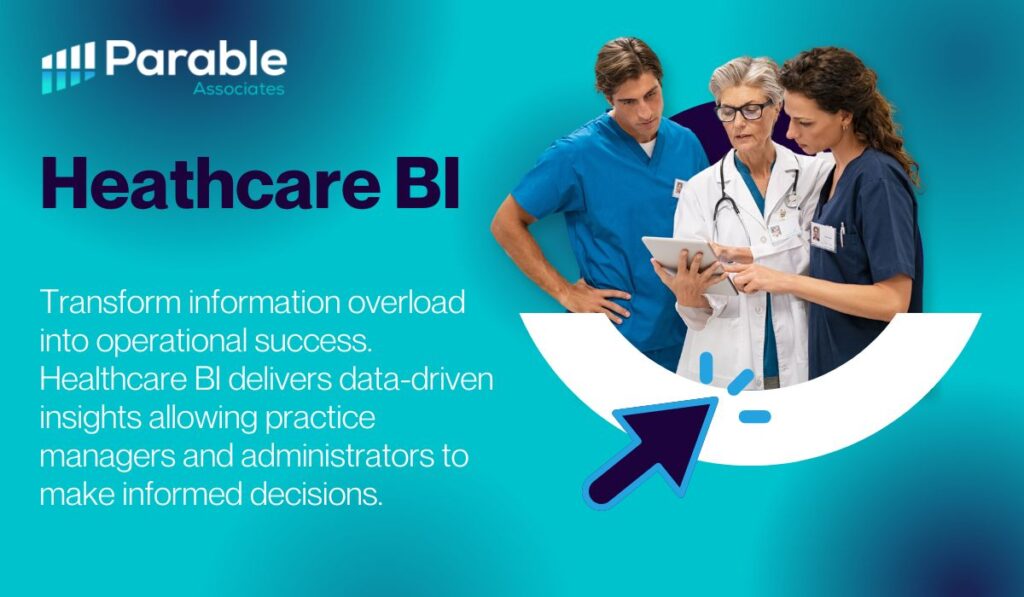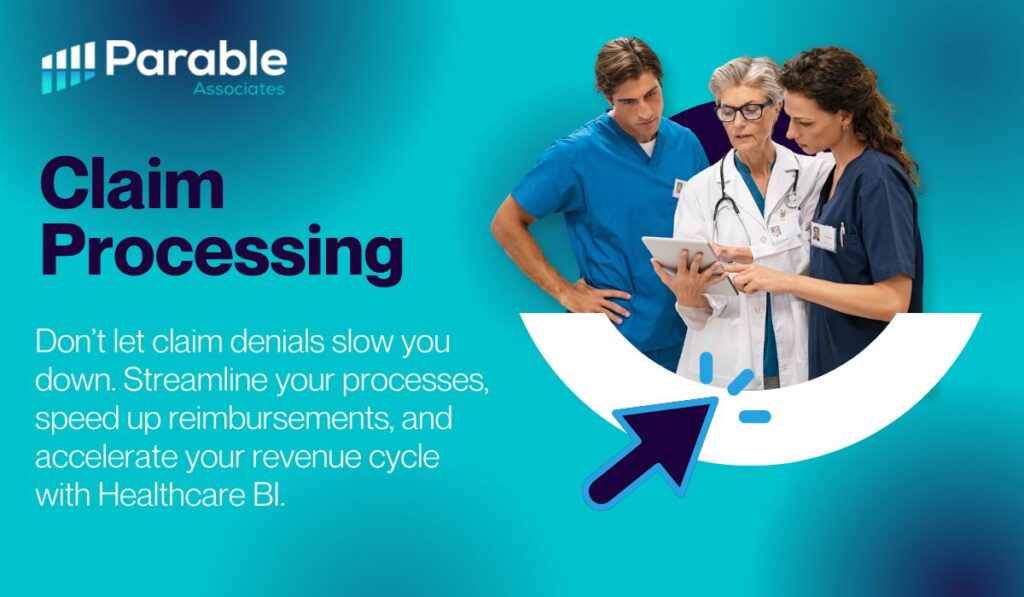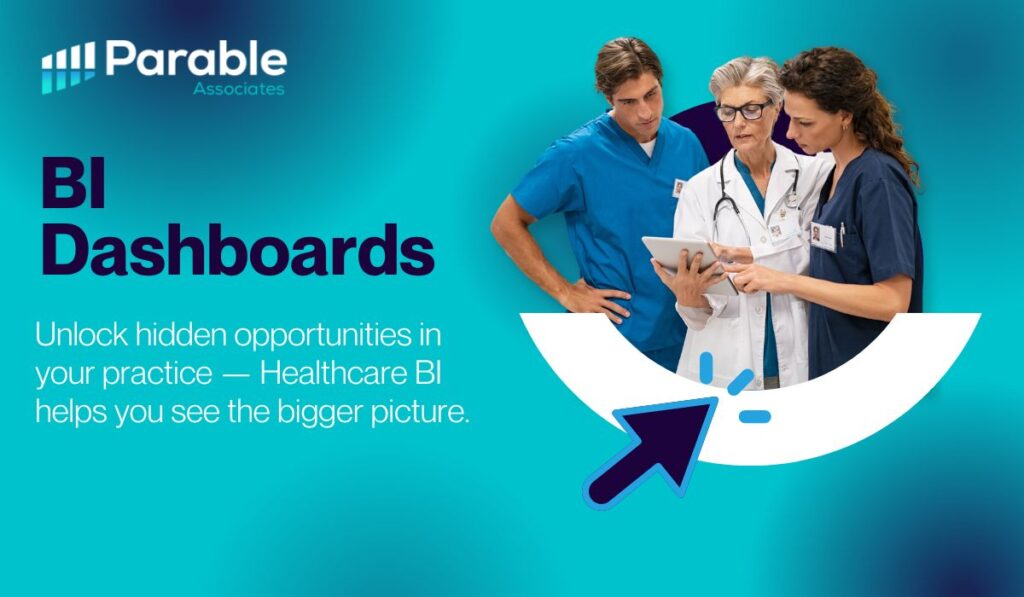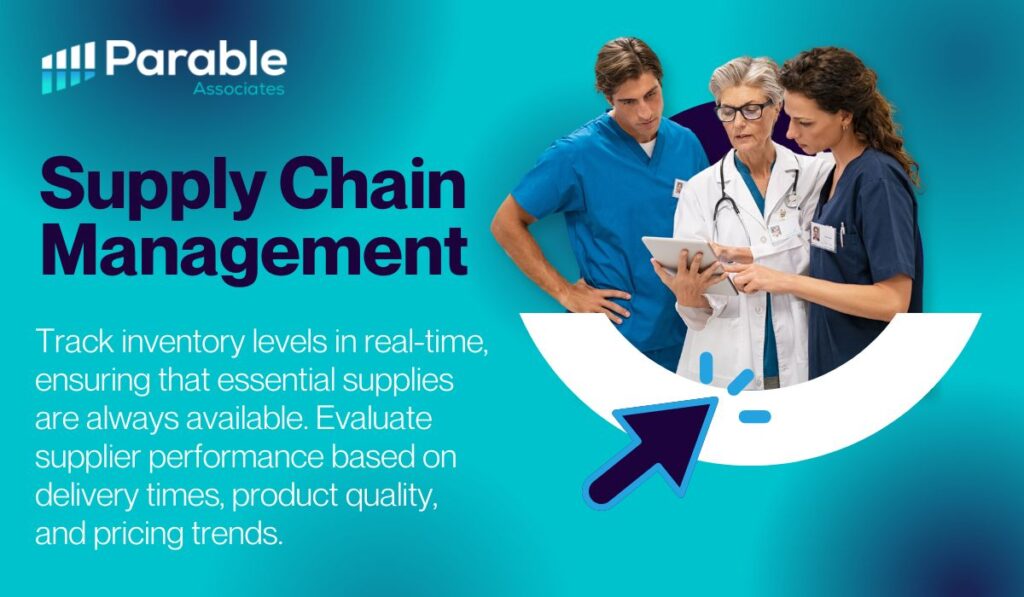Healthcare produces enormous amounts of data every day. However, without structured management, much of it is underutilized. Healthcare BI (business intelligence) is transforming how medical practices operate by turning raw data into actionable insights. By leveraging BI tools, healthcare providers can enhance efficiency, improve patient care, and optimize financial performance.
What is Healthcare BI?
Healthcare business intelligence (BI) refers to the use of data analytics, reporting tools, and visualization platforms to transform raw healthcare data into actionable insights. It enables administrators and practice managers to make informed, data-driven decisions that drive efficiency and profitability.
According to Grand View Research, the global healthcare BI market was valued at $6.9 billion in 2021 and is expected to grow at a compound annual growth rate of 13.5% through 2030. This rapid growth underscores the increasing demand for data-driven insights and decision-making in medical facilities. Whether you run a private practice or manage a large healthcare system, integrating BI solutions can streamline operations and give you a competitive edge.

Streamlining Operations for Enhanced Efficiency
Operational inefficiencies can cause bottlenecks that slow down patient care and administrative workflows. Healthcare BI helps medical facilities identify and eliminate redundant processes by providing real-time data on scheduling, resource allocation, and staff productivity.
By consolidating information from electronic medical records (EMRs), scheduling platforms, and billing systems, BI dashboards give healthcare administrators a centralized view of their operational performance. This enables them to make informed adjustments, such as redistributing staff during peak hours or identifying areas where workflow automation can reduce administrative burdens.
Optimizing Claims Processing
Claims processing is one of the most critical aspects of a healthcare facility’s revenue cycle. According to a recent survey reported in a Medical Economics article, 73% of healthcare providers reported an increase in claim denials, causing delays in payments and additional rework.
Healthcare BI enhances claims management by analyzing patterns in denials and identifying common reasons for rejections. With automated alerts and predictive analytics, billing departments can catch errors before claims are submitted, reducing denial rates and ensuring faster reimbursement.
Many healthcare organizations use BI dashboards to track Claim Adjustment Reason Codes (CARC) and Remittance Advice Remark Codes (RARC), allowing billing teams to categorize denials and prioritize them based on urgency and financial impact.

Empowering Informed Decision-Making
Effective decision-making in healthcare requires accurate, real-time data. Unfortunately, many organizations still rely on retrospective reporting, which delays responses to operational and financial challenges. Healthcare BI enables facility administrators and practice managers to monitor key performance indicators (KPIs) in real time, ensuring proactive, data-driven decisions.
For example, BI tools can analyze patient appointment trends and procedure demand to help ophthalmology practices optimize their service offerings. If data reveals an increasing demand for LASIK procedures while routine eye exams are declining, the practice can adjust its marketing strategy, allocate more resources to refractive surgery, or introduce targeted patient education programs to align with demand.
Visual dashboards further simplify data interpretation, enabling ophthalmology practice managers to quickly assess performance metrics, financial trends, and patient engagement levels. By leveraging these insights, practices can enhance patient care, improve scheduling efficiency, and maximize revenue growth.
Reducing Operational Costs
Rising operational costs are a persistent challenge in healthcare. Inefficient processes and poor resource allocation can lead to significant financial losses. Healthcare BI helps medical practices cut costs by identifying areas of overspending and providing data-driven solutions.
For instance, BI tools can analyze supply chain inefficiencies to reduce unnecessary inventory expenses. Similarly, evaluating workforce productivity allows administrators to make adjustments to prevent understaffing or overstaffing, both of which impact revenue.
Innovation Through Data-Driven Insights
Healthcare innovation requires a strong foundation of data-driven insights. Healthcare BI facilitates research and development by identifying emerging trends in patient care, treatment efficacy, and operational performance.
For example, BI analytics can be used to study treatment outcomes across different demographics, helping providers refine their approaches based on evidence rather than assumptions. Medical facilities can also leverage BI for patient segmentation, tailoring care plans to specific groups for better health outcomes.
As the healthcare industry continues to embrace digital transformation, facilities that actively use BI insights will stay ahead in adopting cutting-edge medical technologies and treatment methodologies.

Elevating Patient Care Quality
A core objective of any healthcare provider is delivering high-quality patient care. Healthcare BI enhances patient outcomes by aggregating clinical data from various sources, allowing providers to track treatment effectiveness, identify at-risk patients, and personalize care plans.
By using predictive analytics, healthcare facilities can detect early warning signs for chronic conditions to ensure timely interventions. Additionally, BI solutions support population health management, helping organizations analyze disease prevalence and implement targeted healthcare programs.
Furthermore, BI-driven reporting improves patient satisfaction by identifying areas for service enhancement, such as reducing wait times or improving follow-up care procedures.
Ensuring Regulatory Compliance
Regulatory compliance is a top priority for healthcare providers, given the strict industry guidelines surrounding patient data privacy and billing transparency. Healthcare BI plays a vital role in ensuring adherence to regulations like HIPAA, MACRA, and the Affordable Care Act.
BI dashboards offer audit-ready reports that streamline regulatory reporting, reducing the risk of non-compliance penalties. Additionally, automated compliance tracking helps facilities stay ahead of policy updates, ensuring that billing and documentation processes meet legal requirements.
By integrating BI solutions, healthcare organizations reduce the manual workload associated with compliance monitoring and minimize the likelihood of costly violations.
Monitoring Performance in Real-Time
Healthcare administrators need instant access to key performance indicators (KPIs) to make timely decisions. Healthcare BI enables real-time monitoring of metrics such as patient flow, appointment cancellations, and financial performance.
Real-time BI dashboards allow facility managers to spot inefficiencies as they arise, rather than addressing them retrospectively. This proactive approach enhances resource utilization, prevents revenue leakage, and ensures optimal patient care.
For instance, a high no-show rate for scheduled appointments can be immediately flagged, allowing administrators to implement solutions such as automated reminders or overbooking strategies to compensate for missed visits.

Optimizing Supply Chain Management
Efficient supply chain management is essential for controlling costs and ensuring that medical facilities have the necessary resources to operate smoothly. Healthcare BI enhances inventory control by providing real-time tracking of supplies, medication stock, and equipment usage.
To illustrate, let’s use a dermatology practice. It relies on a steady supply of medical-grade skincare products, biopsy tools, injectable fillers, and laser equipment consumables. Without proper inventory control, the practice may experience shortages that delay treatments or excessive stock that leads to waste and increased costs.
By implementing healthcare BI, the practice can track inventory levels in real-time, ensuring that essential supplies—such as cryotherapy agents, sutures, and dermal fillers—are always available. BI tools can analyze usage patterns to predict when certain products will run low, automatically flagging reorder points to prevent shortages.
Additionally, BI-driven vendor management allows the practice to evaluate supplier performance based on delivery times, product quality, and pricing trends. For example, if a vendor frequently delivers late or increases prices unpredictably, BI dashboards can highlight these trends, enabling the practice to renegotiate contracts or seek alternative suppliers.
Choose Parable Associates for Healthcare BI
While the healthcare organization improvements discussed here are important, the impact they have on each other is significant. Healthcare BI can help practice managers and facility administrators see the “big picture” with data-driven insights to make informed decisions that propel business growth, operational efficiency, and profitability.
However, implementing healthcare BI requires expertise in data integration, analytics, and regulatory compliance. With years of experience in healthcare BI, Parable Associates has helped practices across specialties—orthopedics, urgent care, ophthalmology, and more—to successfully implement BI to overcome operational challenges. Our tailored solutions ensure every workflow is optimized for maximum efficiency.
With extensive experience in business intelligence consulting, Parable Associates offers:
- Customized BI strategies tailored to your practice’s needs
- Seamless integration with existing EMRs and financial systems
- Ongoing support and training for data-driven decision-making
If your healthcare organization is ready to unlock the full potential of BI, contact Parable Associates today for a consultation. Let us help you transform your operations with cutting-edge healthcare BI solutions.

Benefits of Healthcare BI FAQs
Healthcare BI (Business Intelligence) is the use of data analytics, reporting tools, and visualization platforms to transform raw healthcare data into actionable insights. It helps healthcare facilities improve efficiency, financial performance, and patient care by making data-driven decisions.
BI tools streamline administrative workflows by consolidating data from electronic medical records (EMRs), scheduling systems, and billing platforms. This allows healthcare administrators to identify inefficiencies, optimize resource allocation, and improve patient flow.
By analyzing historical claim data, BI tools can identify common denial reasons, helping billing departments adjust claims before submission. Automated alerts and predictive analytics reduce errors, improve coding accuracy, and increase reimbursement rates.
BI helps providers track treatment effectiveness, identify at-risk patients, and personalize care plans using predictive analytics. It also supports population health management by analyzing disease trends and improving preventative care strategies.
Yes, BI platforms automate compliance tracking, generate audit-ready reports, and ensure adherence to regulations like HIPAA and MACRA. This reduces the risk of non-compliance penalties and streamlines reporting requirements.
Real-time dashboards allow administrators to track key performance indicators (KPIs) such as appointment cancellations, revenue trends, and staff productivity. This enables quick decision-making and proactive problem-solving.
BI tools provide insights into revenue cycles, expense tracking, and payer reimbursement patterns. By identifying inefficiencies and financial bottlenecks, BI helps practices reduce costs and improve cash flow.
Yes, BI enhances inventory tracking by monitoring supply levels, usage patterns, and vendor performance. This ensures that practices maintain optimal stock levels, avoid shortages, and negotiate better supplier contracts.
No, BI solutions are scalable and can be tailored to fit small and mid-sized practices. Many modern BI tools integrate seamlessly with existing practice management systems, making them accessible for various healthcare settings.
Parable Associates specializes in customized BI strategies for healthcare organizations. We provide seamless integration with existing systems, ongoing support, and expert guidance to help practices leverage BI for efficiency, compliance, and growth. Contact us today to learn more.

